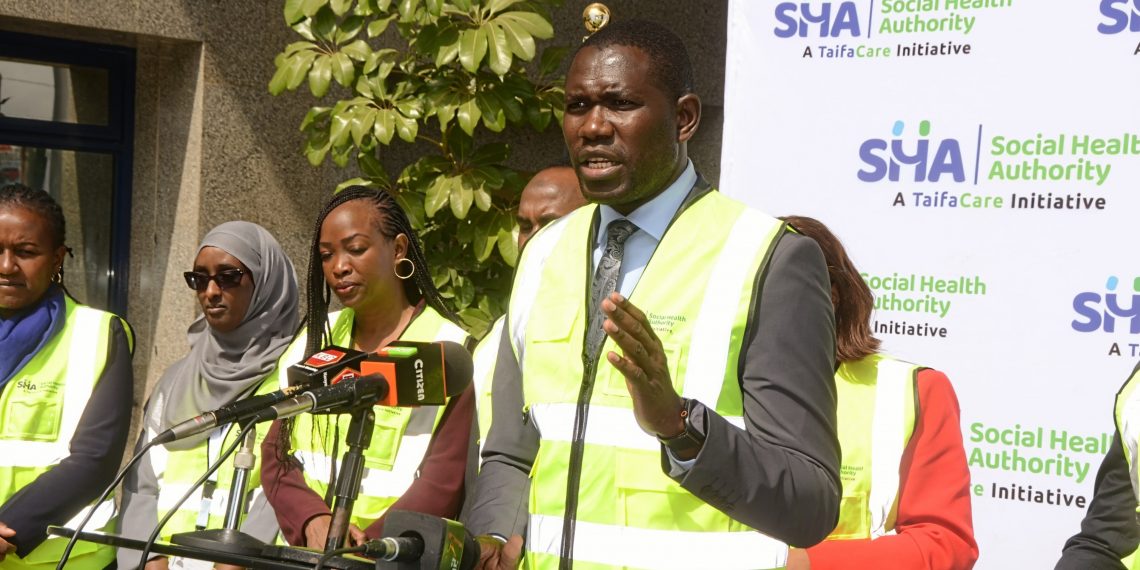The Government of Kenya has taken a bold step towards actualizing universal health coverage with the official flag-off of the Rapid Results Employer Compliance Initiative, a nationwide campaign to ensure that formal sector employers adhere to the Social Health Insurance Act.
The campaign, spearheaded by the Social Health Authority (SHA), was launched at the SHA Headquarters in Nairobi by the Principal Secretary for the State Department for Medical Services, Dr. Ouma Oluga.
The initiative aims to identify, engage, and ensure compliance among employers who have failed to remit employee contributions to the newly established Social Health Insurance Fund (SHIF).
Addressing the press and stakeholders at the event, Dr. Oluga painted a picture of urgency and shared responsibility.
“Today marks the beginning of a nationwide push to strengthen compliance with the Social Health Insurance Act,” he said. “In Nairobi alone, over 12,900 employers have been flagged for non-compliance, with arrears totaling more than KES 3 billion. That is not a small figure—and it directly impacts our ability to pay hospitals and offer healthcare services to Kenyans.”
While the numbers may be staggering, Dr. Oluga was quick to stress that the initiative is not a punitive campaign, but a collaborative effort to fix a critical gap in the health financing system.
“This is not about punishment. It is about building and strengthening partnerships and shared responsibility,” he said. “The SHA team will work hand-in-hand with employers to support and guide them toward compliance.”
The event also showcased SHA’s digital compliance platform, which is set to revolutionize health insurance administration in the country.
Dr. Oluga personally inspected the new system, which uses real-time data to track employer contributions, detect arrears, and streamline enforcement.
“SHA is not the old system. It is a new, digital, transparent, and accountable system,” he said. “We have invested in systems that allow us to track contributions, identify gaps, and act quickly. This is about building public trust—and we will continue to demonstrate that this Authority puts people first.”
The new system is part of SHA’s broader transformation agenda following the passage of the Social Health Insurance Act in 2023, which replaced the former National Health Insurance Fund (NHIF). Under the restructured system, health coverage is provided through three distinct funds: the Primary Healthcare Fund (PHC), the Social Health Insurance Fund (SHIF), and the Emergency, Chronic, and Critical Illness Fund (ECCIF).
The government has committed to fully fund primary healthcare through the PHC fund, while SHIF contributions from employers and individuals cover higher-level services. In cases of chronic or critical illness, the ECCIF offers additional protection for those who exceed their SHIF limits.
The PS also took time to address the challenges faced by the informal sector. With many Kenyans living on fluctuating incomes, SHA has introduced a flexible payment model dubbed Lipa SHA Pole Pole, allowing beneficiaries to pay their insurance premiums in manageable installments.
“We understand the financial pressures our people face. That’s why SHA has introduced Lipa SHA Pole Pole,” Dr. Oluga said. “And once you pay, there is no waiting period. You are covered.”
The Rapid Results Initiative will begin in Nairobi, before expanding to other counties including Kiambu and Kajiado in the next phase, with a national scale-up planned over the coming months.
“This is just Phase One. We are building—and we are taking every county along on this journey,” said the PS.
Dr. Oluga called on all employers in Nairobi to cooperate with SHA officials, urging them to “ask questions, raise concerns, but above all, comply.” He also appealed to the media to help carry the message to all corners of the country, reinforcing that SHA represents a fresh start for health coverage in Kenya.
“This is a new SHA, with a new mandate and a new way of doing things,” he said.
The flag-off event ended with renewed commitment from SHA officers, stakeholders, and ministry officials to continue rolling out the reforms needed to deliver on the long-awaited promise of universal health coverage.














